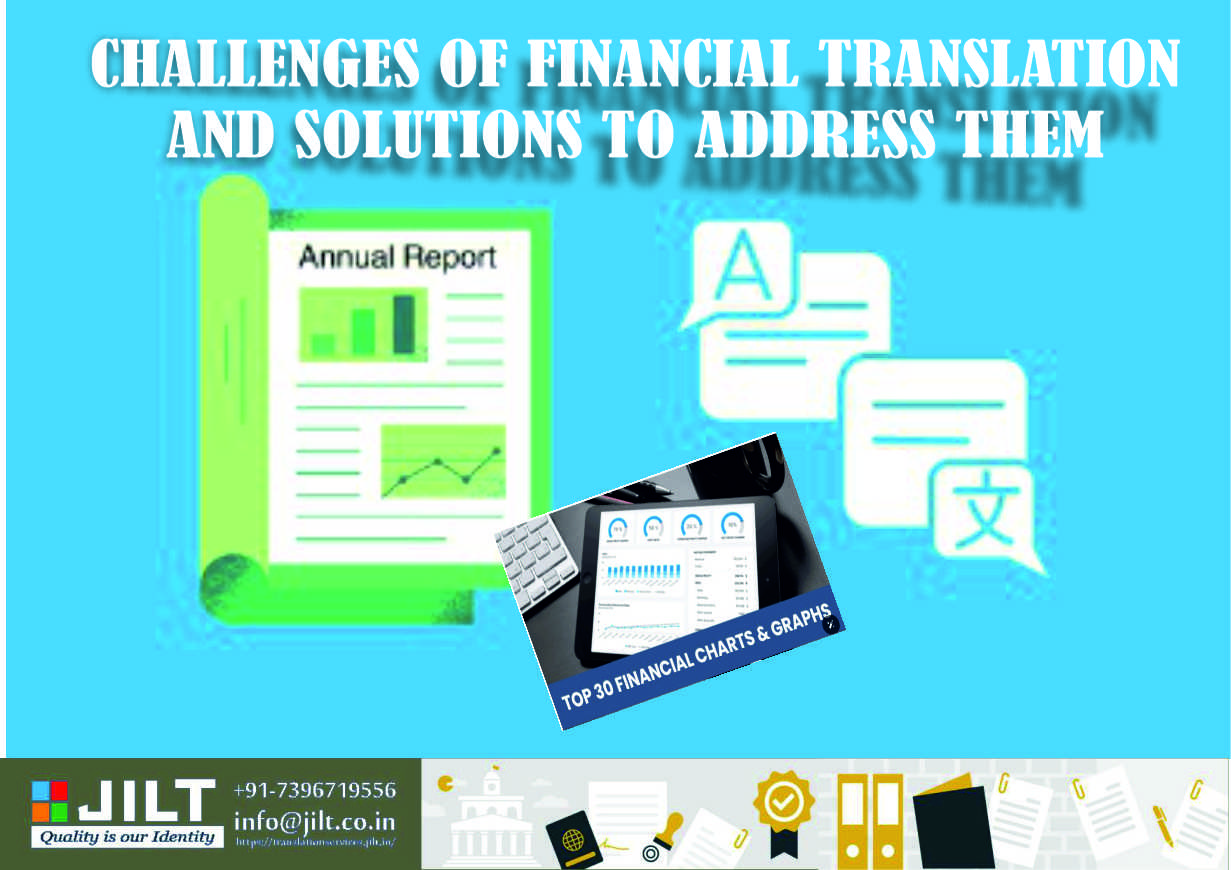
CHALLENGES OF FINANCIAL TRANSLATION AND SOLUTIONS TO ADDRESS THEM
by Dr. Abu Mazhar Khalid Siddique - March 18, 2024
INTRODUCTION
As the world becomes more connected, the need for accurate financial translation services is growing at a rate that has never been seen before. As companies grow and do business across countries, it's important that they can share accurate and complete financial information in the languages that people there speak. It's impossible to overstate how important financial translation is for making sure conversation and understanding are smooth in a wide range of markets, whether it's for regulatory compliance, investor relations, or market penetration strategies.
Financial translation is important for more than just communication; it's also a key way for foreign companies to get ahead in local markets and deal with complicated financial situations. Globalization has made it easier for local and foreign businesses to merge, buy each other, and work together. However, the complicated nature of financial documents needs to be carefully translated to ensure compliance and openness. Expert financial translators are very important for bridging linguistic and cultural gaps, making transactions go more smoothly, and building trust among stakeholders in a global economy that is becoming more linked.
The Challenges Involved In Financial Translation
1. Financial Terminology & Language Usages
Finding your way around the complicated world of financial translation is hard, and using the right words is the most important thing. Even a small mistake in translation can have big effects, from financial data being misunderstood to problems with following the rules. This shows how important it is to translate financial terms correctly, which requires a deep understanding of the subtleties and complexities of the finance business.
Not only do financial translators need to be good at languages, but they also need to know a lot about the terms and ideas used in finance. The unique jargon used in the finance industry often gets past language hurdles, so translators have to be very good at navigating these complexities to get the message across correctly. Since words may stay the same in different languages, it is very important for translators to keep things consistent while also changing things to fit the language and culture of the audience. This makes sure that everyone can understand and lowers the chance of misunderstanding.
Solution : Recruiting Professional Translators with Financial Expertise
The most effective way to overcome this obstacle is to delegate the assignment to professional translators who are either experts in the subject of financial translation or have a significant amount of experience in the financial sector. When you do this, you can be certain that a trained financial translator will provide you with expert services in the field of financial translation.
2. Maintaining the privacy of financial documents
Different types of financial papers, like cash flow statements and tax returns, hold private and sensitive information that is necessary for a business to run. Leaking these kinds of papers would be very bad for everyone. It would not only hurt the company's reputation, but it would also hurt the economy and financial institutions.
If financial statements or reports are accidentally made public, it can hurt the company's image, make it less competitive, and lead to more scrutiny from regulators. Putting private financial information out in the open could also make scams easier, which could cost money and have legal consequences. Because financial information is so important, strict measures must be in place to protect it from being stolen. These include strong encryption methods, access controls, and training programs for employees. Getting rid of the chance of data leaks needs a complete plan that puts privacy, honesty, and following the rules first. This will protect everyone's interests and keep the finances stable.
Solution: Implementing Confidentiality Agreements and Encryption Technologies
Clients and the translation agency should enter into non-disclosure agreements (NDAs) with the financial translators working on the project in order to surmount this obstacle. The protocols delineate the responsibilities of all parties involved in upholding the confidentiality of data. Further, organizations have the ability to fortify the security of a multitude of sensitive financial documents by integrating secure data storage systems, encrypted communication channels, and secure file transfer protocols.
3. Consistency and Numerical Accuracy in Financial Translations
When translating finances, accuracy in numbers is very important, especially when it comes to papers like balance sheets and income statements. It's hard to keep things correct and consistent across languages because number forms, currency symbols, and decimal separators are often different. Translators have to deal with all of these tricky language issues so that financial numbers can be understood and interpreted correctly.
Paying close attention to every detail is very important because even small changes in how numbers are shown can cause confusion and could result in financial problems. Translators need to know a lot about how numbers are used in both the source language and the target language. They also need to know how to change numbers while keeping their integrity and clarity. Financial translators are very important for making sure that people can communicate accurately across borders and building trust in the global financial scene by paying close attention to these small details.
Solution: Effective Project Management and Collaboration
When it comes to meeting stringent deadlines in the field of financial translation, effective project management is absolutely necessary. Streamlining the translation process can be accomplished by establishing clear communication channels, establishing realistic schedules, and coordinating the efforts of translators, proofreaders, and project managers. Increasing productivity, ensuring smooth communication and document sharing, and meeting time-sensitive translation requirements can all be accomplished through the utilization of cloud-based collaboration platforms and project management tools.
4. The Importance of Time and Meeting Deadlines
Due to the crucial timing of financial transactions and reporting duties, the field of financial translation operates within a framework of tight time limitations. These time constraints govern the framework. There is strict adherence to publication dates for annual reports and financial statements, which are essential indicators of a company's performance. These documents require translation procedures to be punctual and precise in order to meet the requirements.
It is necessary to have precise project management in order to achieve timely delivery of translated financial documents. This management must be characterized by effective allocation of resources, clear communication channels, and seamless collaboration among translators, clients, and stakeholders. The ability of translators to maximize productivity without sacrificing accuracy can be achieved by strategic planning and workflow streamlining. This allows translators to ensure that translations are done in a timely manner, which is essential in order to fulfill the urgent demands of financial deadlines. A successful management of time not only ensures that the integrity of financial reporting is maintained, but it also helps to strengthen trust and reliability in the translation services that are offered, which in turn increases customer satisfaction and helps to cultivate long-term partnerships within the financial industry.
Solution: Effective Project Management and Collaboration
When it comes to meeting stringent deadlines in the field of financial translation, effective project management is absolutely necessary. Streamlining the translation process can be accomplished by establishing clear communication channels, establishing realistic schedules, and coordinating the efforts of translators, proofreaders, and project managers. Increasing productivity, ensuring smooth communication and document sharing, and meeting time-sensitive translation requirements can all be accomplished through the utilization of cloud-based collaboration platforms and project management tools.
5. Differences in Legal and Cultural Practices
Financial translation services work in a world where different cultures and laws interact in complicated ways. This means that translators have to be very careful to follow all the rules. Different countries have different financial rules, tax laws, and accounting methods, so translators need to be able to understand these differences and change their work to meet local standards while still keeping the original content's integrity.
Also, financial papers often use culturally specific language, so translators need to be sensitive and knowledgeable about different cultures. When these kinds of references are translated incorrectly, they can cause confusion or even hurt the trustworthiness of the material that was translated. As a result, translators need to be fluent in more than one language and understand the cultural details that are woven into financial language. This is to make sure that translations are accurate for the people they are meant for while still following all the rules and laws. Financial translators are very important to cross-border communication and mutual understanding in the global financial field because they know how to handle all of these legal and cultural issues with ease.
Solution: Localization, Cultural Adaptation and Collaboration with Local Firms
Localization is an essential part of financial translation since it entails modifying the content that has been translated so that it is appropriate for the cultural and legal context of the audience that is being targeted. For the purpose of ensuring that the translated information complies with local legislation and retains cultural sensitivity, translators should have a strong understanding of both the source culture and the target culture simultaneously.
Engaging in collaborative efforts with native speakers, professional localization agencies, and local accounting firms can yield useful insights that can be utilized to guarantee appropriate translations of financial documents.
The process of translating financial documents poses a number of obstacles that require professional knowledge, precision, and a grasp of the financial industry. The experts working in this industry are able to effectively overcome these problems if they acknowledge them and take action to address them.
In conclusion, the challenges of financial translation stem from the intricate interplay of legal, cultural, and numerical complexities. However, strategic solutions exist to address these hurdles effectively. By fostering a deep understanding of diverse regulatory frameworks and cultural nuances, translators can navigate through varying landscapes with precision. Implementing efficient project management practices, clear communication channels, and leveraging technological advancements further enhance the translation process's efficiency. Additionally, continuous professional development and collaboration within multidisciplinary teams facilitate the development of tailored solutions to meet the evolving demands of financial translation. Embracing these solutions empowers translators to deliver accurate, culturally sensitive translations, thus mitigating challenges and ensuring seamless cross-border communication in the financial domain.
- Also Read :- Telugu Seniors Translators Visit to JILT Translation Services in Hyderabad campus
- Also Read :- What does the “internet of things” mean?
- Also Read :- TOP 12 ANCIENT CITIES IN THE WORLD
- Also Read :- Birth certificate translation (JILT )
- Also Read :- MALEGAON NATIONAL URDU BOOK FAIR
- Also Read :- Legal Implications of Machine Translation and Solution
- Also Read :- Physical or Chemical Analysis Reports of Products Translation Service
- Also Read :- National Trade Certificate Translation Services
- Also Read :- HISTORY OF SPANISH LANGUAGE
- Also Read :- Phytosanitary Certificate Translation Service
Search
Categories
Archives by Month
Popular Blog
QUICK TRANSLATION QUOTE
Need help with a translation?
Get in touch with us
Whether you have a specific project you want to discuss, need a translation quote or simply want to discuss your requirements, do not hesitate to get in touch with us.











Social Networks